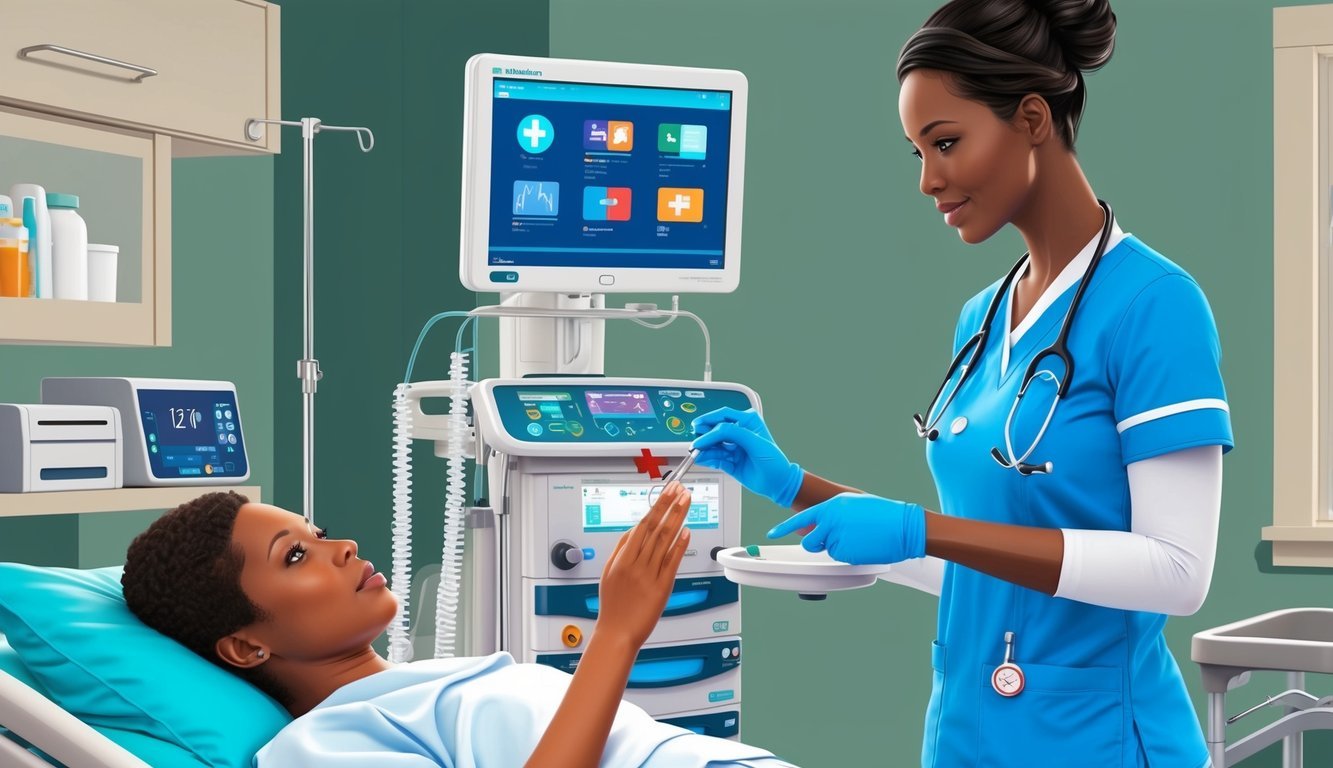As you explore the field of nursing, you may wonder about the role of a rehab nurse. Rehab nurses play a crucial part in helping patients recover from injuries and manage chronic illnesses.
They work closely with patients to develop personalized care plans, ensuring that each person receives the support needed for optimal recovery.
This specialized area of nursing is both rewarding and challenging, requiring a unique skill set and a deep understanding of rehabilitation practices.
If you’re considering a career in this dynamic field, it’s essential to know what it takes to succeed.
From the educational requirements to the various responsibilities you will undertake, the journey of a rehab nurse is filled with opportunities for professional growth.
The demand for rehabilitation nurses is also increasing, making this an appealing career choice for those interested in making a difference in patients’ lives.
Understanding the vital impact rehab nurses have on recovery can inspire you to pursue this path.
By the end of this article, you will gain insights into the responsibilities, educational background, and future prospects within the field of rehabilitation nursing.
Key Takeaways
- Rehab nurses support patients in their recovery journey after illness or injury.
- Specialized education and certification enhance your skills in this field.
- The demand for rehab nurses is growing, offering numerous career opportunities.
Role and Responsibilities
As a rehab nurse, your role is crucial in helping patients regain their independence and improve their quality of life.
You will be involved in direct patient care and work closely with interdisciplinary teams in various care settings.
Patient Care and Therapy
In rehabilitation nursing, you focus on assessing and addressing the unique needs of each patient.
You conduct thorough evaluations to understand their physical, emotional, and psychological conditions.
You design and implement personalized treatment plans based on these assessments.
Your duties include educating patients on their conditions, guiding them through recovery exercises, and helping them adapt to life changes.
Effective communication is essential.
You collaborate with physical and occupational therapists to implement therapy that improves mobility and self-care abilities.
Your support motivates patients to remain engaged in their rehabilitation process.
Care Settings and Interdisciplinary Teams
Rehab nurses work in various settings, including hospitals and rehabilitation centers.
In these environments, you collaborate with a team of healthcare professionals, including doctors, therapists, and social workers.
Your responsibilities extend to coordinating care, managing resources, and advocating for patients’ needs.
You ensure that everyone involved in the rehabilitation team is informed and aligned with the patient’s goals.
Regular team meetings help in adjusting treatment plans based on patient progress.
By sharing insights, you contribute to enhancing the overall quality of care and outcomes for those you serve.
Education and Certification

To become a rehabilitation nurse, you need the right education and certifications.
This section will provide details on your paths to entering this field and the advanced certifications available for ongoing professional growth.
Paths to Becoming a Rehab Nurse
To start your career as a rehabilitation nurse, you must first obtain the necessary education.
You can choose between an Associate Degree in Nursing (ADN) or a Bachelor of Science in Nursing (BSN).
| Degree Type | Duration | Description |
|---|---|---|
| Associate Degree (ADN) | 2 years | Focuses on basic nursing skills and clinical practice. |
| Bachelor Degree (BSN) | 4 years | Provides advanced nursing concepts and leadership training. |
After earning your degree, you need to pass the NCLEX-RN exam to obtain your RN licensure.
This step is crucial to practice as a registered nurse.
Consider adding relevant courses in rehabilitation nursing to enhance your knowledge.
These can often be found in online nursing degree programs, providing flexibility as you study.
Advanced Certifications
Once you are a licensed RN, you can advance your career through certifications.
The most recognized certification is the Certified Rehabilitation Registered Nurse (CRRN).
This credential is awarded by the Association of Rehabilitation Nurses and indicates your proficiency in rehabilitation nursing.
To earn the CRRN certification, you must meet the following requirements:
- Hold an active RN license.
- Have at least 1,000 hours of practice in rehabilitation nursing within the last 5 years.
- Pass the CRRN examination.
Continuing education is often necessary to maintain your certification.
You should stay updated on the latest practices and innovations in the field.
Many resources and courses are available, including online platforms, to help you meet these requirements.
Professional Development
Professional development is essential for rehab nurses to enhance their skills and advance their careers.
It focuses on continued learning and improvement, as well as leadership and advancement opportunities in the field.
Continued Learning and Improvement
Continued education is vital in the nursing field, especially for rehabilitation nurses.
Engaging in ongoing training helps you stay updated on the latest practices, research findings, and innovations in rehabilitation.
Consider attending workshops or conferences that provide valuable insights into new techniques and interventions.
You might also explore online courses that focus on quality improvement and health policy.
Joining professional organizations can offer resources and networking opportunities to enhance your learning.
For example, the Association of Rehabilitation Nurses (ARN) provides access to journals and webinars that can deepen your knowledge.
Leadership and Advancement
Leadership roles in rehabilitation nursing can open doors for career growth.
You can take steps to enhance your leadership skills by participating in mentorship programs or pursuing formal education in nursing leadership.
Advancement can lead to more responsibilities and higher salaries.
Positions such as nurse manager or clinical leader require solid leadership skills and a strong understanding of healthcare policies.
You should also embrace opportunities for research, which can influence health policy and improve patient outcomes.
Collaborating with colleagues on research projects highlights your leadership potential and can make you a strong candidate for higher-level positions.
Clinical Skills

As a rehabilitation nurse, you need strong clinical skills to effectively assess, plan, and implement care for patients with various disabilities and chronic illnesses.
These skills help guide your approach to pain management and support patients’ self-care efforts.
Assessment and Planning
In rehabilitation nursing, thorough assessment is crucial.
You will evaluate each patient’s physical, emotional, and social needs.
This includes understanding their medical history, current conditions, and any disabilities they may face.
You may use tools like pain scales to measure discomfort and functional assessments to gauge mobility.
Based on this information, you will create a personalized care plan.
This plan should focus on improving the patient’s independence and promoting self-care techniques.
Key elements of assessment:
- Medical history review
- Functional ability assessments
- Pain management evaluation
Effective planning will involve setting realistic goals for recovery.
Always collaborate with your healthcare team to ensure the plan is comprehensive and tailored to the individual.
Intervention and Management
Intervention involves implementing the care plan and monitoring patient progress.
As a rehabilitation nurse, you will provide hands-on nursing care, including administering medications and assisting with therapies.
You will also counsel patients and their families on pain management strategies and techniques to manage chronic illnesses.
Educating patients about self-care is a vital part of your role.
Important interventions could include:
- Administering medications and monitoring effects
- Assisting with physical therapy exercises
- Counseling on emotional support resources
Your focus on patient education will empower them to take an active role in their rehabilitation journey.
By supporting patients in understanding their conditions, you help them achieve their recovery goals more effectively.
The Future of Rehab Nursing
As the field of rehabilitation nursing evolves, understanding the latest trends and innovations is crucial for your career development.
Staying informed can help you navigate changes in patient care and employment opportunities.
Trends in Healthcare
The healthcare landscape is shifting towards a more patient-centered approach.
You will see an increasing emphasis on personalized care plans that address the unique needs of each patient.
This trend is driven by advances in technology and a growing awareness of mental health’s role in recovery.
The demand for skilled rehab nurses is expected to grow.
According to the Bureau of Labor Statistics, jobs for registered nurses are projected to increase by 9% from 2020 to 2030, creating ample opportunities for you.
To stay competitive, consider pursuing advanced certifications or additional education in specialized areas of rehabilitation.
Innovations in Rehabilitation Care
Innovative technologies are transforming rehabilitation practices.
Telehealth is gaining popularity, allowing you to connect with patients remotely for consultations and follow-ups.
This can lead to increased access to care, especially for those in rural areas.
Assistive devices and applications are also becoming more sophisticated.
Wearable technology can track patients’ progress and provide real-time feedback.
This data can help you adjust treatment plans and improve outcomes.
Embracing these innovations not only enhances your skills but also improves the quality of care you provide.
Explore resources like the Association of Rehabilitation Nurses for further insights and educational opportunities.
Frequently Asked Questions
This section addresses common queries related to rehabilitation nursing, focusing on qualifications, daily responsibilities, skills needed for success, and certification processes.
Understanding these aspects can provide a clearer picture of the role and its demands.
What are the essential qualifications for a rehab nurse?
To become a rehabilitation nurse, you need to earn either an Associate Degree in Nursing (ADN) or a Bachelor of Science in Nursing (BSN).
Both pathways require passing the NCLEX-RN exam to obtain your nursing license.
What does a typical day for a rehab nurse entail?
A typical day involves assessing patients, coordinating care plans, and collaborating with a healthcare team.
You may spend time directly with patients, helping them with exercises and daily activities, while also managing documentation and communication with family members.
What are the primary responsibilities of a rehab nurse?
Your primary responsibilities as a rehab nurse include developing individualized care plans, monitoring patient progress, and educating patients about their recovery process.
You will also manage medications and support patients in achieving their rehabilitation goals.
What skills are crucial for success in rehab nursing?
Crucial skills for rehab nursing include strong communication, empathy, and problem-solving abilities.
You should also be patient and possess good organizational skills to handle various tasks and manage patient care effectively.
How does one become a certified rehabilitation registered nurse?
To become a Certified Rehabilitation Registered Nurse (CRRN), you need to have a valid RN license, meet specific practice hours in rehabilitation nursing, and pass the CRRN certification exam.
Resources to prepare for the exam can be found through organizations like the Association of Rehabilitation Nurses (ARN).
What are the challenges faced by nurses working in rehabilitation?
In rehab nursing, managing high-stress situations and lengthy patient loads can be challenging.
You will also encounter emotional difficulties.
This is because patients may struggle with the physical and psychological impacts of their conditions.

